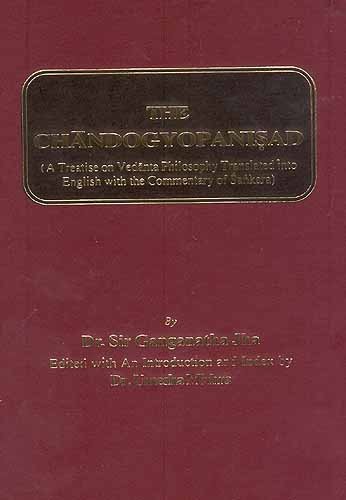Chandogya Upanishad (Shankara Bhashya)
by Ganganatha Jha | 1942 | 149,749 words | ISBN-10: 8170842840 | ISBN-13: 9788170842842
This is the English translation of the Chandogya Upanishad, an ancient philosophical text originally written in Sanksrit and dating to at least the 8th century BCE. Having eight chapters (adhyayas) and many sub-sections (khandas), this text is counted among the largest of it's kind. The Chandogya Upanishad, being connected to the Samaveda, represen...
Section 1.5 (fifth khaṇḍa) (five texts)
Commentary (Śaṅkara Bhāṣya):
The Text now proceeds to describe that meditation of the syllable which brings its reward in the shape of several sons, and in which the syllable is looked upon as qualified by diversities of breath and of rays; this description follows after the identification of the Praṇava and the Udgītha, which in its turn, is preceded by a reiteration of what has been already said in regard to the meditation of the Udgītha as contemplated in the form of Breath and the Sun:—
Upaniṣad text:
Now, verily, that which is Udgītha is Prāṇava; that which is Praṇava is Udgītha. This Sun verily is Udgītha and it is Praṇava; because it moves along uttering Om.—(1)
Commentary (Śaṅkara Bhāṣya):
Now, verily, that which is Udgītha is Praṇava,—What is ‘Praṇava’ for the Ṛgvedins,—that is precisely what, in the Sāmaveda, is spoken of by the name ‘Udgītha’.—This Sun is Udgītha, and It is Praṇava; that is, what is spoken of, among Ṛgvedins by the name ‘Praṇava’ is this same Sun, not anything else. Udgītha is the Sun;—Why?—because it is this syllable Om, which is named Udgītha, which this Sun utters;—the word ‘svaran’ signifying utterance or pronunciation by reason of one and the same root having several meanings,—or it may mean goes,—and mooes along;—and for this reason the Sun is Udgītha. (1).
Upaniṣad text:
“To Him verily did I sing; hence thou art my only one.”—So said Kauṣītaki to his son;—“Do thou reflect upon the Rays; so wilt thou have many”.—This is as relating to Divinities.—(2)
Commentary (Śaṅkara Bhāṣya):
“To Him verily did I sing,—1 addressed the song to Him,—that is, I reflected upon the Sun regarding Him as identical with the Rays;—hence,—for this reason,—thou art my only one—Son”; So said Kauṣītaki—the son of Kuṣītaka,—to his son.—“For this reason, thou should reflect upon the Sun and the Rays as distinct from one another.”—The term ‘paryāvartayāt’ (Third Person, Singular) should be taken as ‘paryāvartaya’ (Second Person Singular), because of the presence of the second person pronoun ‘Thou’.—“Thus wilt thou have many sons”.—This is as relating to Divinities.—(2)
Upaniṣad text:
Now with reference to the Body:—That which is the Breath in the Mouth,—on that one should meditate as Udgītha; because it moves along pronouncing Om,—(3)
Commentary (Śaṅkara Bhāṣya):
Now—after this,—is described the Meditation in reference to the Body,—That which is the Breath in the mouth,—on that one should meditate as ‘Udgītha’ etc., etc.,—as above (under Text 1).—Similarly, this Breath also moves along pronouncing Om; that is, it moves along for the purpose of exciting speech and other functions, while pronouncing the syllable ‘Om’, thereby according permission, as it were, to the said functionings. [That this is so is shown by the fact that] at the time of that a man is dying, persons near him do not hear the Breath pronouncing ‘Om’ (as Speech and the other functions have ceased).—On this analogy, in the case of the Sun also, the pronouncing of ‘Om’ should be regarded merely as according permission.—(3)
Upaniṣad text:
“This verily did I sing to Him; hence thou art my only one”,—so said Kauṣītaki to his son; “Thou shouldst sing to the Breaths as manifold,—so that thou mayst have many.”—(4)
Commentary (Śaṅkara Bhāṣya):
This verily did I sing etc., etc.—as before. Hence one should view Speech and the other Breaths and the Breath in the Mouth as distinct from one another, and thus reflect in his mind, upon them as manifold,—as before;—the idea being that ‘by so doing many sons may be born to me The contemplation of Breath, and of the Sun, as, singly representing Udgītha is defective, in so far as it brings, as its reward, a single son, and, as such, should be discarded; and the contemplation of the manifold Rays (of the Sun) and the manifold Breaths, as representing Udgītha, what should be practised, as leading to better results in the shape of many sons;—this is what has been taught in this section.—(4)
Upaniṣad text:
Now, verily, that which is Udgītha is Praṇava; that which is Praṇava is Udgītha. [Knowing this], one, from the seat of the Hotr-priest rectifies wrong singing;—yea, he doth rectify it.—(5)
Commentary (Śaṅkara Bhāṣya):
That which is Udgītha etc.—In this text has been set forth the view that Udgītha and Praṇava are one; the reward of this knowledge is now described. The Hotṛ ṣadana is the place seated where the Hotṛ-Priest does the chanting; the phrase ‘from the seat of the Hotṛ-priest should be taken as standing for ‘having rightly performed the functions of the Hotṛ-priest’; as no result can accrue from the mere seat.—“What is that reward?—It is this—Whatever may have been badly or wrongly sung by the Udgātṛ-Priest in course of the performance of his functions,—i.e. whatever mistakes he may have committed,—all that be rectifies, sets right; just as the disorders of the bodily humours are set right by proper medication.—(5)
